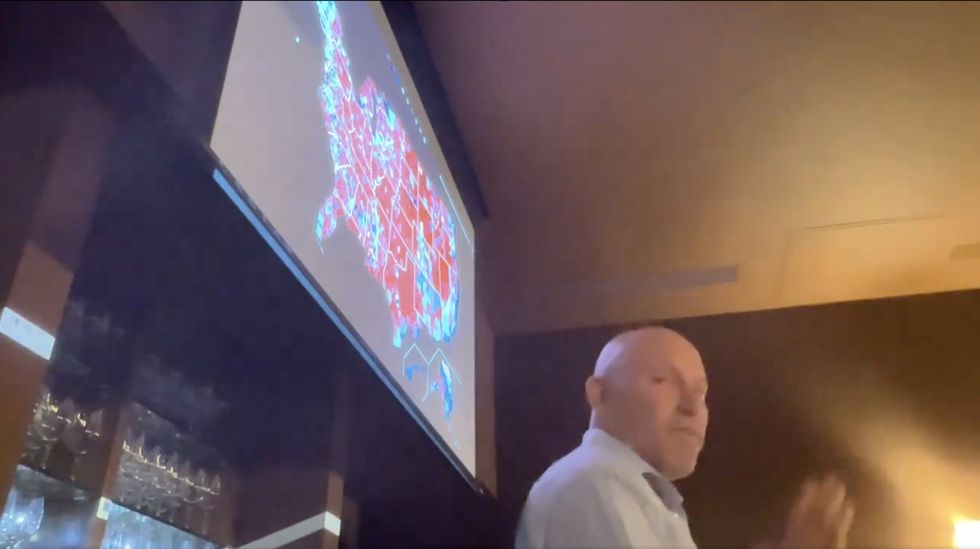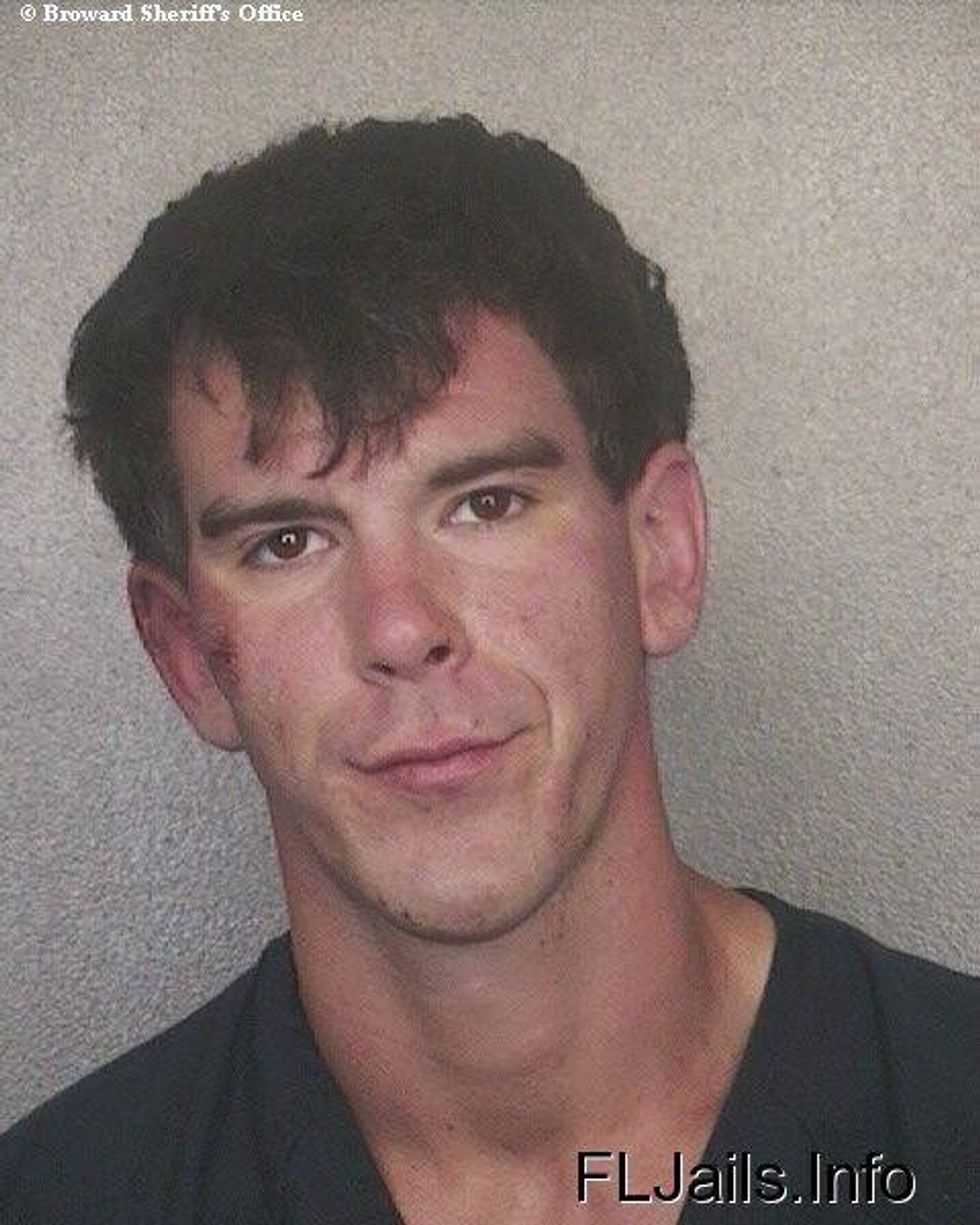Texas sheriffs engage conspiracy theorist who created Trump enemies 'target list'
The self-styled “secretary of retribution” for Donald Trump, who created a “Deep State target list” a prominent congressman describes as a “vigilante death warrant for hundreds of Americans,” received an audience earlier this month with the very people he’s sought to attract: law enforcement officers.
Ivan Raiklin, a retired Army lieutenant colonel with designs on conducting “live-streamed swatting raids” against the more than 350 politicians, federal employees, journalists and others on the list, detailed his plans to about two dozen police officials gathered earlier this month for a sheriffs’ association conference in Fort Worth, Texas.
RELATED ARTICLE: Trump’s ‘secretary of retribution’ has a ‘target list’ of 350 people he wants arrested
Raiklin’s 20-minute presentation to the Texas law enforcement officials took place in a private meeting room on July 22 in a restaurant in Fort Worth, according to a video reviewed by Raw Story.
During his presentation, Raiklin laid out a legally dubious plan in which he suggested the law enforcement officials could investigate various high-ranking Democrats by reviewing their private communications on the social media platform X, and then correlating the geo-located data to their local counties.
In previous interviews on right-wing podcasts, Raiklin has suggested that the communications, were they to be disclosed, would provide digital evidence of crimes that would then justify law enforcement investigations and “swatting raids” — the latter term apparently referring to arrests.
Raw Story has confirmed that at least two county sheriffs were among the law enforcement personnel attending the event, which one sheriff said was hosted by an organization called Texans for Constitutional Sheriffs.
“We are pleading with you at the county level,” Raiklin told the group, adding that he plans to “use capabilities like some people have in this room to sift through all of their digital assets.”
With Trump now facing presumptive Democratic presidential nominee Kamala Harris in the 2024 election, Raiklin predicted that the next six weeks in American politics would get “spicy,” and he presented a conspiratorial narrative about supposed ruthless “Deep State” agents willing to go to any lengths to maintain their hold on power.
RELATED ARTICLE: Trump ‘secretary of retribution’ won't discuss his ‘target list’ at RNC
“They may have already assassinated Joe Biden, for all we know,” Raiklin said during his talk, which took place one day after President Joe Biden announced his decision to drop out of the presidential race. (Contrary to speculation by right-wing conspiracy theorists, Biden is alive.)
“They are willing to go to any length to retain their power, and we have to go to the mat to make sure that we get our constitutional order back in place,” Raiklin continued. “And it requires everybody in this room and your colleagues at the county level — local action, national impact — to reset and body-check this lawlessness.”
The law enforcement personnel in the audience participated in Raiklin’s classroom-style presentation by engaging in a call-and-response session.
For example, Raiklin asked the sheriff officials to name a business mogul who had recently moved his company headquarters from California to Texas.
“Elon Musk,” one man responded.
Raiklin also called on them to name the local Texas counties where they worked.
 A screenshot of Ivan Raiklin giving a presentation to Texas sheriffs in a private meeting room at a restaurant, which took place during the Sheriffs' Association of Texas Annual Training Conference and Expo in Fort Worth in July. (Source: Ivan Raiklin video)
A screenshot of Ivan Raiklin giving a presentation to Texas sheriffs in a private meeting room at a restaurant, which took place during the Sheriffs' Association of Texas Annual Training Conference and Expo in Fort Worth in July. (Source: Ivan Raiklin video)
“We want to see all forms of communication between Twitter employees and their emails, and their internal Slack channels, and their Twitter direct messages inside the Twitter platform with the geo-tagged, geo-located metadata applied to everyone on the Deep State target list,” Raiklin said. “And then decide where a criminal interaction took place by jurisdiction. Anything that has Texas on it in county….”
Raiklin paused, and then called on one of the audience members.
“What county?” he asked a stocky man with piercing blue eyes.
That man, Sheriff Edward A. Miller, volunteered to Raiklin that he leads the sheriff’s office in Shackelford, a county with a population of 3,105 that is roughly 125 miles west of Fort Worth and not near any interstate highways.
With this tangible piece of information, Raiklin continued his hypothetical, asking the law enforcement officials to imagine that Rep. Jamie Raskin (D-MD) — a prominent, liberal congressman who previously expressed concern about Raiklin to Raw Story — was “driving through Shackelford County.”
RELATED ARTICLE: Texas news station removes press release praising Trump's ‘secretary of retribution’
Then, perhaps recognizing the remote likelihood of the hypothetical, Raiklin abruptly asked for another volunteer.
An unidentified man volunteered the name of McLennan County, located on Interstate 35 between Austin and the Dallas-Fort Worth region. Its county seat is the city of Waco.
Then, Raiklin moved on to a more plausible place where Raskin might travel.
“Who is near a major airport?” he asked. “Anyone?”
A woman attending Raiklin’s presentation volunteered the names of Tarrant and Dallas, the two counties across which Dallas/Fort Worth International Airport stretches.
Miller, the sheriff of Shackelford County, Texas, told Raw Story by phone that Raiklin’s presentation was put on by Texans for Constitutional Sheriffs. Sheriff Parnell McNamara of McLennan County told Raw Story that someone he didn't know invited him to the restaurant for a steak dinner while he was eating lunch at the Fort Worth Convention Center, where the Sheriff's Association of Texas Annual Training Conference and Expo was held from July 20 to July 23.
McNamara said he ate the steak, but didn't stay for the presentation. He told Raw Story he doesn't know Raiklin and hasn't communicated with him before or since.
After reviewing social media posts showing Raiklin mingling in the exhibition hall at the conference, Skylor Hearn, executive director of the Sheriffs' Association of Texas, confirmed that they show Raiklin wearing an "exhibitor" badge issued by the association.
Some of the posts depicting Raiklin at the sheriffs' conference show him seated in front of large placards for two different organizations — one that provides legal support to defendants charged in connection with the Jan. 6, 2021 attack on the U.S. Capitol, and the other promoting the hand-counting of election ballots.
One post includes a photograph showing Raiklin speaking with Morris County, Texas, Sheriff Jack Martin. The caption indicates that Martin had been “informed to be prepared” to receive a tranche of private messages from X “and let his district attorney know it’s coming for Deep State Target List development.”
Martin did not return multiple messages from Raw Story seeking comment on Raiklin’s pitch. Nor did the sheriffs’ offices in Tarrant and Dallas counties, which were both referenced by one of the audience members during Raiklin’s presentation.
“We get a wide variety of vendors,” Hearn told Raw Story. “If someone is willing to stop and listen to them, they can talk about their widgets or their worldview.”
McNamara, the sheriff in McLennan County, said he was similarly enticed when he received the invitation to Raiklin's presentation at the restaurant.
"Different vendors are wanting you to come and wanting to buy you dinner, and I thought that's what this was about," he said.
The sheriffs' conference included official trainings that allow participants to earn credits through the Texas Commission on Law Enforcement, but Hearn said Raiklin’s presentation to the sheriffs at the restaurant “was definitely not part of our programming.”
Raiklin, who attended the sheriffs conference only three days after appearing at the Republican National Convention in Milwaukee as a credentialed guest, did not respond to requests for comment on this story.
When Raw Story approached Raiklin last month at the Republican National Convention, Raiklin refused to answer various questions, including those about his "target list" and plan to work with largely rural, conservative county sheriffs to deputize some 75,000 military veterans to arrest people on his list.
The video of Raiklin's presentation shows a man who appears to be Kirk Launius, founder and director of Texans for Constitutional Sheriffs, assisting Raiklin by selecting a slide for his audio-visual presentation.
Launius' LinkedIn profile describes him as a Dallas-based "global internet entrepreneur, mobile business coach, social media strategist and philanthropist" who was previously employed as a Dallas police officer. Launius ran unsuccessfully for sheriff of Dallas County in 2012 and 2016.
Launius could not be reached for comment for this story.
‘America will respond in kind’
Since the beginning of the year, Raiklin has zealously promoted his plan to enlist sheriffs to detain federal employees and others who have run afoul of Trump and retired Lt. Gen. Michael Flynn, Trump’s former national security adviser.
On podcasts and social media, Raiklin often presents a bill of particulars against individuals on his “target list” based on a dubious legal framework and dubious claims, such as suggesting without evidence that the unidentified person responsible for setting pipe bombs outside the Democratic National Committee and Republican National Committee on Jan. 6, 2021, was “a subordinate-surrogate of the Capitol Police Board,” which oversees the Capitol Police.
Raiklin’s claims carry an undercurrent of violence: He accuses perceived Trump enemies of treason, and his social media followers sometimes make the logical leap that people on Raiklin’s “target list” should face the punishment of death.
Raiklin has forged a close relationship with Flynn, who was his former boss at the Defense Intelligence Agency, a federal entity where Raiklin worked during the past decade. Following an unsuccessful run for U.S. Senate from Virginia in 2018, Raiklin became an avid Trump supporter, and worked in tandem with Flynn to overturn the 2020 election.
Over the course of this year, Raiklin has appeared at events to promote a laudatory documentary film about Flynn.
Prior to each screening, Raiklin typically presents a museum-style “evidence wall” arguing that many of the individuals on his “Deep State target list” conspired in a plot to persecute Flynn.
Flynn pleaded guilty in 2017 to lying to the FBI about his contacts with Russian ambassador Sergey Kislyak. But the U.S. Department of Justice dropped its case against Flynn in May 2020, and later that year, then-President Trump issued Flynn a pardon.
Raiklin’s rhetoric over the past two months has escalated to the point where he has directly called for violence.
In one X post, Raiklin mocked former national security adviser Alexander Vindman, suggesting that he would “speak to him in person” and asking for his “preferred punishment for committing treason.” Raiklin supporters on X responded by suggesting variations on hanging or execution by firing squad.
Since the attempt on Trump’s life at a campaign rally in Pennsylvania on July 13, Raiklin has claimed without evidence that members of the so-called “Deep State” are involved in a plot to assassinate the former president and current 2024 Republican nominee for president.
In an X post on July 22, Raiklin decreed that “all leading contenders” to replace Biden as the Democratic nominee — Vice President Kamala Harris ostensibly included — “are to be treated as the ones behind ordering the assassination of President Trump.” He further warned that “America will respond in kind unless they turn themselves in.”
Lira Gallagher, a spokesperson for the FBI Washington Field Office, declined to comment on whether Raiklin is on the agency’s radar.
During his presentation to the Texas sheriffs, Raiklin singled out Raskin, the ranking member of the House Oversight Committee, for scrutiny.
MOTHER OF ALL TWITTER FILES IMMINENT?! Sep 3, by @IvanRaiklin https://t.co/stzrPsADgi
To: @KenPaxtonTX @elonmusk @SpeakerJohnson @Jim_Jordan @RepJamesComer @RepLoudermilk pic.twitter.com/ir1oh7iHZ5
— Ivan Raiklin (@IvanRaiklin) July 23, 2024
Raskin has previously described Raiklin’s list as a “vigilante death warrant for hundreds of Americans, and a clear and present danger to the survival of American democracy and freedom.” Raskin called on House Speaker Mike Johnson (R-LA) and Senate Majority Leader Chuck Schumer (D-NY) to repudiate threats of political violence.
Since then, Raiklin has appeared to taunt Raskin by posting a photo of himself clasping hands with Rep. Clay Higgins (R-LA) at the Republican National Convention. Higgins has falsely claimed that a “ghost bus… filled with FBI informants dressed as Trump supporters” descended on the Capitol on Jan. 6."
“What do you think we discussed, @RepRaskin?” Raiklin wrote. “Maybe @SpeakerJohnson can tell you.”
Then, on the same day he spoke to the Texas sheriffs, Raiklin accused Raskin of being “involved in the assassination attempt” against Trump, while acknowledging that he has no evidence to back his claim.
Miller, the sheriff of Shackelford County, said he came away confused about what Raiklin was asking him to do.
“I don’t know where you would come up with a crime if they’re 30,000 feet in the air,” Miller told Raw Story. “It seems like that would be more likely to be investigated as a federal conspiracy.”
Miller said he expected Raiklin’s talk to provide sheriffs with insight on how they can follow the Constitution, but that wasn’t what they heard.
“My opinion is that the presentation that should have been given is, ‘This is the United States Constitution. We believe that the sheriff and the county should follow the Constitution as it relates to the inalienable rights of the citizens,’” Miller said. “That wasn’t the presentation that was given. It was a presentation on politics.”
When Raiklin asked whom in the audience might be “near a major airport,” he zeroed in on the biggest political target of all — Harris — the candidate who is all but certain to go up against Donald Trump in the presidential election.
An unidentified woman in the audience volunteered that Tarrant and Dallas counties in Texas encompass Dallas/Fort Worth International Airport.
“Imagine they flew through there as they’re waiting,” Raiklin said. “They communicate.”
He went on to specifically name Harris, while suggesting that the law enforcement officers could investigate her “comms team” based on private emails that they might have exchanged while waiting for a connecting flight.
Raiklin’s motivations — and a pitch to law enforcement
During his presentation in Fort Worth, Raiklin suggested his motivation for attempting to exact retribution on federal government employees was being placed under surveillance by the Department of Homeland Security following Jan. 6, 2021, when he was spotted on the grounds of the U.S. Capitol.
In the runup to Jan. 6, Raiklin had promoted a plan called “Operation Pence Card,” which called for then-Vice President Mike Pence to set aside electoral votes in states narrowly won by Biden, which would have effectively flipped the election in Trump’s favor.
“And in the case of my situation — top Secret clearance, reserve lieutenant colonel — cleared TSA pre-check,” Raiklin said, apparently referring to a pat down. “But when I go to travel — not anymore — for 21 months, they subjected me to that Fourth Amendment gang rape, as I reported that procedure, okay? Is that cool?”
To establish his qualifications, Raiklin told the group assembled for his presentation that he finished his military career teaching “intelligence analysis at the nation’s premier intelligence analytic program in the U.S. intel community at the Defense Intelligence Agency.
“I’m not the smartest guy in the room, but I may know what I’m talking about when it comes to conducting structured analytic techniques, link analysis, timeline, chronology — all taking that capability and applying it to something isn’t right in America,” he added.
Raiklin’s plan depends on cooperation from a series of powerful actors, as he explained to the law enforcement officers present for his presentation.
He told them he wants to see three Republican congressmen who chair House committees — Reps. Jim Jordan of Ohio, James Comer of Kentucky, and Barry Loudermilk of Georgia — or Texas Attorney General Ken Paxton subpoena X owner Elon Musk for the private direct messages of the 350-some individuals on his “Deep State target list.”
A spokesperson for Loudermilk did not respond to a request for comment on the record, and emails to Jordan, Comer and Paxton similarly went unreturned.
Prior to speaking with sheriffs in Fort Worth last week, Raiklin had attempted to cultivate relationships with sheriffs through the Constitutional Sheriffs and Peace Officers Association, which espouses the controversial belief that sheriffs are the highest law in the land and are not legally required to uphold state and federal laws they deem to be unconstitutional.
But even Richard Mack, the founder of the Constitutional Sheriffs and Peace Officers Association, eventually concluded that Raiklin’s plan was flawed, telling Raw Story “it reeks of lawsuits, and it doesn’t follow due process.”


 Paul Kryscuk. (Courtesy Broward County Sheriff's Office)
Paul Kryscuk. (Courtesy Broward County Sheriff's Office) Liam Montgomery Collins. (Facebook photo)
Liam Montgomery Collins. (Facebook photo)